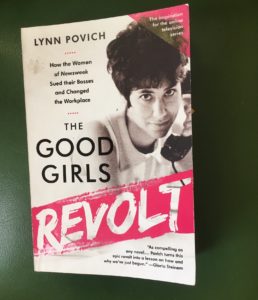
The Good Girls Revolt: How the Women of Newsweek Magazine Sued Their Bosses and Changed the Workplace, author Lynn Povich’s 2012 memoir of a landmark 1970 gender discrimination suit brought by 46 women employees of Newsweek magazine, shows the advances women have made toward achieving equality in the workplace, but also the obstacles that remain, both in the systems that perpetuate outmoded attitudes and practices and in women’s levels of comfort in stepping up to speak out for basic rights and protections.
The women journalists—including author Povich—who stepped up publicly to claim gender-based discrimination in the complaint filed with the Equal Employment Opportunity Commission against Newsweek magazine had no way of knowing when they agreed to sign their names to the complaint how profoundly they would be affected by the results of their actions. They risked their comfort at a time when it was unseemly for women to protest the male-dominated status quo, and though they were elevated as pioneers and role models for women journalists facing similar discrimination, some of the women struggled in the aftermath of the events portrayed in this account.
In fact, though the women sued for the right to be bylined reporters—as opposed to uncredited researchers who did the lion’s share of background research for the male reporters at a fraction of the pay—the pressure to perform at exceptional levels once they’d won the right to be credited writers on the editorial pages was more than some of them could manage. In some respects they were in the vanguard of the women’s liberation movement, but many were reluctant feminists. Some of the women found they didn’t particularly enjoy reporting and that they genuinely preferred the behind-the-scenes profile of the researcher, but felt they had to take the promotion on principle, on behalf of all women.
The suit paved the way for advances for women in the media more broadly, and for more opportunities for talented journalists to excel, regardless of gender, but the impacts on individual lives were also profound and unforeseen. Povich herself was a success story among the women; five years after the suit, she was named the first female editor at the magazine, and she cites successes in the years between 1975 and 1985 of many talented women journalists who were able to take advantage of the career opportunities afforded them at the publication.
But as the foreword to the book attests, women journalists at Newsweek continued to face obstacles in subsequent decades, and by 2009, female employees of the company were awakening as a group to the fact that they were systemically disadvantaged by a deeply ingrained culture of sexism at the organization. Those women, Povich relates, were unaware of the 1970s lawsuit that had supposedly settled their right to considerations that they were still fighting to secure. Journalists Jesse Ellison, Jessica Bennett and others were shocked to learn of the actions by an earlier generation of women journalists at the magazine. “We realized we were far from the first to feel discrimination,” Ellison recalls. “So much of the language and culture was still the same. It helped drive home the fact that it was still the same place, the same institutional knowledge, the same Newsweek.”
The Good Girls Revolt: How the Women of Newsweek Sued their Bosses and Changed the Workplace, Lynn Povich, 2012. PublicAffairs, an imprint of Perseus Books.